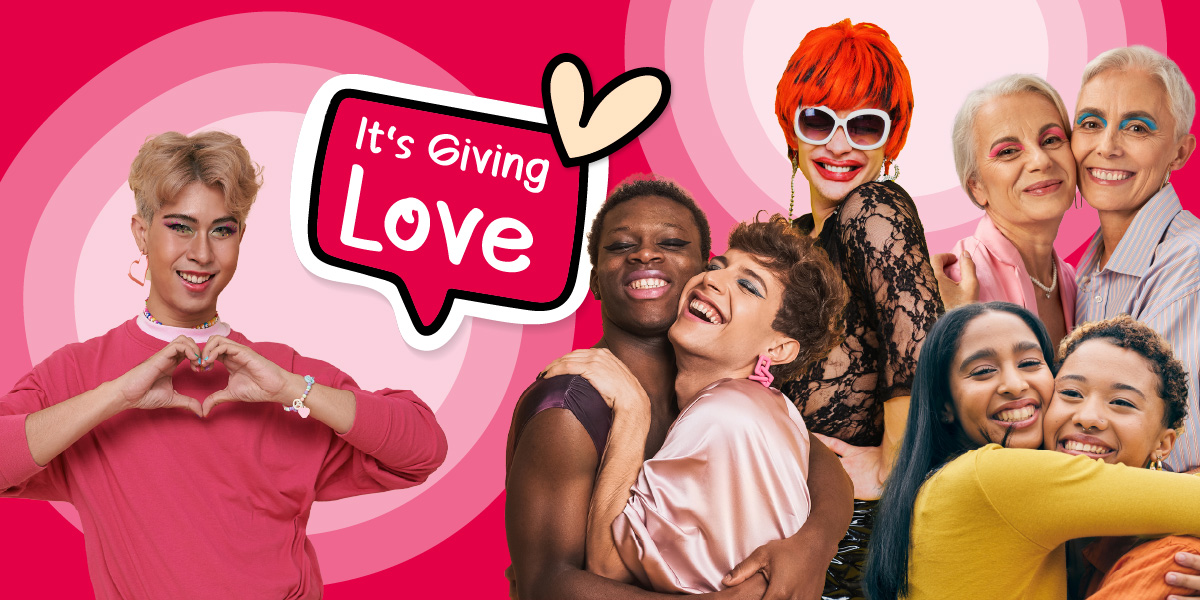
This February, help us say loud and proud – #ItsGivingLove
Jump to: Ways to Give Love | Donate | Terms & Definitions of Love
Queerly beloveds,
it’s important to remember that Valentine’s Day is not just reserved for the hallmark type of love. There are so many ways that 2SLGBTQI people care and love each other, and there are just as many ways that allies can love us too!
Your active and impactful allyship? It’s giving… love
Here are some ways that allies can contribute to the spirit of giving love:
- Respect everyone’s identities by using someone’s correct pronouns.
- Exercise 2SLGBTQI allyship through continued learning, practice and reflection.
- Plan safer events for 2SLGBTQI people.
- Create gender-neutral facilities for everyone to use.
- Help Us Remain – learn how to change the way 2SLGBTQI people with dementia are treated.
- Break down barriers for 2SLGBTQI people in sport.
- Learn about our research projects on topics of mental health, aging, healthcare experiences and employment.

Support our work and this campaign. Make a donation below!
Here’s a quick rundown on some terms and definitions that relate to different ways some 2SLGBTQI people love:
Chosen Family
A chosen family is a group of people who have made intentional choices to relate to each other as family even though they are not biologically or legal related. The term comes from a historical context where 2SLGBTQI people have experienced discrimination from both biological kin and from law that prohibited legal kinship (such as marriage or adoption).
Aromantic Umbrella
A person who experiences little to no romantic forms of attraction to others. When used as an umbrella term, it encompasses identities reflecting a range of experiences and degrees of interest in romantic intimacy, including demiromantic and grayromantic. A demiromantic person experiences romantic attraction to someone only after having an emotional bond to them and a grayromantic person may have a wide range of experiences including experiencing romantic attraction rarely, under specific circumstances, and/or experiences fluctuations of romantic attraction.
Queer and Trans Sexual Joy
In the face of homophobia, biphobia, transphobia, and gender-based sexual violence, queer and trans sexual joy is a celebration and practice of trust, authenticity, and connection. Queer and trans sexual joy fosters shared senses of creative play, experimentation, and openness. These experiences allow 2SLGBTQI to feel greater freedom, expansiveness, and liberation which not only highlights personal benefits, but also impacts the broader political potential of queer and trans liberation through sexual joy. See our research report on this topic for more.
Asexual Umbrella
A person who does not experience sexual attraction, and/or who has little to no interest in sexual activity. When used as an umbrella term, it encompasses identities reflecting a range of experiences and degrees of interest in sexual intimacy, including demisexual and graysexual. A demisexual person experiences sexual attraction to someone only after having an emotional bond to them and a graysexual person may have a wide range of experiences including experiencing sexual attraction rarely, under specific circumstances, and/or experiences fluctuations of sexual attraction.
Polyamory/Non-monogamy
Polyamory is a deliberate relationship structure where everyone can have as many romantic partners as they want. There are no restrictions on individuals based on who they’re partnered with, and people are free to express their sexuality regardless of gender. Polyamory is one type of relationship style that falls under the umbrella of non-monogamy. So, all polyamory is non-monogamy, but not all non-monogamy is polyamory. Polyamory specifically refers to multiple loving relationships, whereas non-monogamy is any arrangement where people have multiple consensual romantic, sexual, and/or intimate connections. These relationships are often based in communication, trust, and a philosophy that sexual or romantic exclusivity regards sex and love as a finite resource when there are ways to experience intimacy in abundance. See Polyphilia Blog for more.
Can you tell that one of the ways we love you is by sharing knowledge with you?

For further questions about this campaign and Egale’s work, contact communications@egale.ca